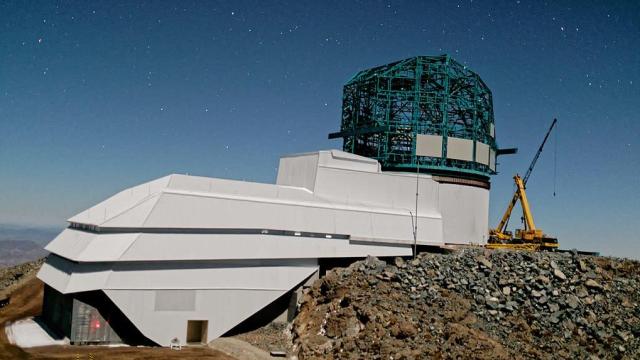U.S. Congress voted last month to rename the Large Synoptic Survey Telescope as the NSF Vera C. Rubin Observatory, commemorating an astronomer credited with advancing humanity’s understanding of dark matter.
The Rubin Observatory will be the most advanced survey of the night sky, recording the stars each night with a car-sized, 3.2-gigapixel digital camera. The survey will hopefully contribute to our understanding of the dark matter that Rubin researched, as well as other hot topics in astronomy.
“Named after an astronomer who provided important evidence of the existence of dark matter, the NSF Vera C. Rubin Observatory seems destined to make science history with its extraordinary capabilities that will come to bear in the next few years,” said France Córdova, director of the National Science Foundation, in a press release.
Astronomer Fritz Zwicky coined the term dark matter in 1933 to try and explain the mysterious source of gravity that was preventing the Coma cluster of galaxies from spreading apart. Later observations deepened the mystery. Among the most important was Vera Rubin’s finding that galaxies seem to rotate just as quickly at their outer rim as they do closer to their centre, hinting that they contain more mass than what we calculate from their stars alone. She published her work in 1980. Today, more observations have revealed that unaccounted-for mass seems to make up the very scaffolding of the universe, representing around five times more mass than the stuff astronomers can actually see.
Other astronomers have long considered Rubin an overlooked figure in astronomy and a symbol of the challenges women face in the field. For example, when she was pregnant and scheduled to deliver a presentation on her thesis, one of her advisors suggested he present it on her behalf, in his own name. Though recognised for her work, Rubin never received the Nobel Prize, despite receiving nominations. Others have pointed out that the work she presented on dark matter was similar to work on a similar mysterious force, dark energy, that garnered three men the Nobel Prize in 2011.
The Rubin Observatory will study dark matter and dark energy from a mountaintop in Chile by looking into the large-scale structure of the night sky, along with transient events like supernovae that can cause changes from night to night. It is the first U.S. observatory to be named for a woman.
“Vera Rubin’s research transformed our understanding of galaxies by observationally showing that they grow up inside dark matter halos,” said Amanda Bauer, interim deputy director of operations at the Rubin Observatory, in a press release. “Naming the observatory in her honour is a fitting tribute, an important statement about visibility and inclusivity in astronomy, and makes me proud to be involved in such an extraordinary project.”
But the field of observational astronomy field is still fraught with issues of inequality. Women are still vastly underrepresented as Nobel prizewinners, and in 2017, women represented just 21 per cent of physics bachelors’ degrees, 20 per cent of physics doctorates, 33 per cent of astronomy bachelors’ degrees, and 40 per cent of astronomy doctorates, according to American Institute of Physics surveys. Things are improving, somewhat, according to the same survey: “In 2014, 16% of physics faculty members and 19% of astronomy faculty members were women. In 2016, 26% of newly hired physics faculty members and 40% of newly hired astronomy faculty members were women. The percentage of faculty members who are women is increasing over time.”
Other issues are less about statistics and more about the climate: Women astronomers reported widespread sexual harassment in a 2017 survey; men still earn higher salaries 10 to 15 years after receiving a physics degree; and some scientists will still go on public sexist tirades about women’s physics abilities. All of these issues are only part of a larger issue of injustice in astronomy physics, where people of colour are underrepresented and the concerns of indigenous people are overlooked.
Representation is important, but it’s most effective when it leads to actual change. The new telescope renaming is a long-overdue tribute to an influential and beloved scientist.
